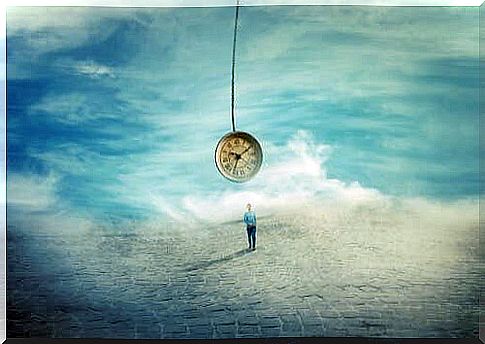To Postpone Happiness To The Future … I Will Be Happy When …

Postponing happiness to the future is something that many people are guilty of. Sometimes you think: “My life will be so much better when I finally find a new job” ; or: “I will finally have fun when I go on vacation”; or: “I will spend time with those I love when the test is over”? In that case, you have fallen victim to a very common mentality.
What makes people think this way? Why do you tell yourself that everything will be so much better when you have achieved certain goals or bought certain material goods? And why do you put off your well-being and pleasure? Many believe that this is just a way of living up to a high (and strict) standard, while others believe that it is a very effective form of self-sabotage.
When you put your happiness on ice and imagine that the future will offer exquisite and magical things, you live with an illusion. In fact, it blinds you to the falsehood of believing in an ideal future.
If you e.g. Imagine that you will be happier when you get more money or if you decide not to go to the beach until you have lost weight, you are just distorting the true meaning of the word “happiness”.
Let’s take a closer look at these concepts to postpone happiness to the future.

Postponing your happiness is a mistake that can affect your health
We live in conditional conditions. Therefore, we begin many of our thoughts and desires with the word “about”. If I had more money, everything would be better. If I was promoted, people would see what I can do. If I were more attractive I would find a partner… Such thoughts give rise to unnecessary suffering that affects your well-being.
In psychology, this kind of view and attitude is characterized as the deferred happiness syndrome. The term is used to describe people who are always waiting for concrete and specific circumstances to appear in their lives. Yes, this wait is sometimes justified, especially if you invest time and money in achieving something concrete. For example, if you decide to spend more time studying and less time out with your friends because you want to pass an important exam.
In such cases, it is reasonable to push certain things aside, as it is for a specific purpose. But if you suffer from the delayed happiness syndrome, you have no logical reason to postpone things. Instead, put forward arguments that are to your detriment and that have a tendency to only approach your suffering and discomfort. An example of this is the notion that your life will be so much better if you lose a little weight or change your appearance.
Those who choose to postpone happiness to the future or postpone their happiness do so because they do not accept or are not happy with the moment that is. They do not know how to focus and take advantage of what is happening here and now, the moment they are in and all that it offers.
What makes people postpone happiness?
Although it may seem difficult to pinpoint what constitutes happiness, from a psychological point of view it is very easy to define. Happiness is accepting and loving oneself. It means having a meaningful life with a supportive social network and cognitive resources to be able to handle difficult situations. That’s where it’s. Nothing more is needed.
So if you postpone your happiness, it is probably due to concrete problems, such as:
- Dissatisfaction with who you are and what you have. You are constantly worried about what you are missing.
- Fear of dealing with what is painful at the moment or of changing something you dislike.

If you choose to postpone happiness, you will never achieve it
Clive Hamilton, a professor of philosophy at Charles Sturt University in Australia, wrote an article entitled “Carpe diem? The deferred happiness syndrome “. According to this professor, it is society itself that has made us hunt for this “carrot” that we never access.
We are always looking for something elusive. Even though we rarely find it, it is something we constantly long for. We long for it because we are unhappy. That we are unhappy depends on our jobs, our living conditions and the consumer society. These make us believe that we need certain things to feel good and be happy. In this way, society tells us that we will have a better life if we get a better phone, nice clothes and a nice house.
Another factor is the limited time we have to just “be”; to discover ourselves and to get in touch with what we want and those we love. Hamilton believes that we should be a little braver and make decisions that make us feel good. We should live a life that is more in tune with our desires and needs. Stop rushing around and worry about the future. Instead, stop and live in the moment that is.









